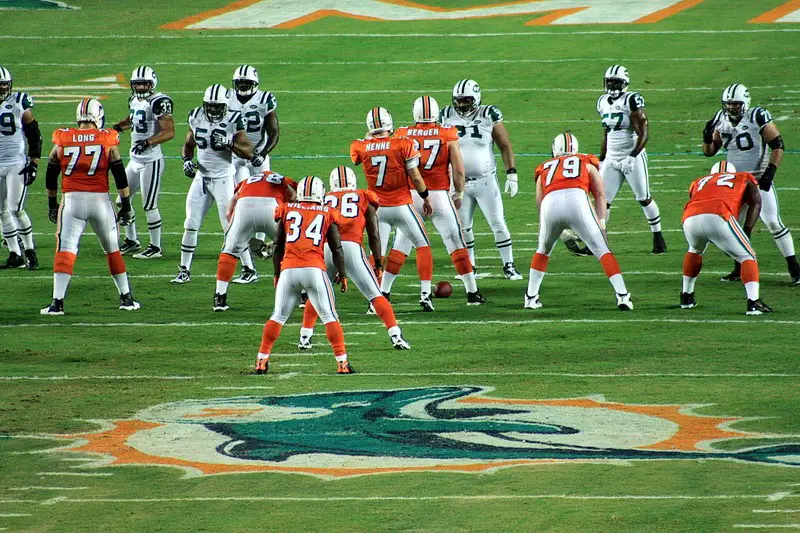Former Miami Dolphins defensive lineman Randy Crowder, noted for both his athletic prowess and a significant drug conviction that interrupted his career, passed away on May 21, 2025, at the age of 72. The Miami Dolphins confirmed his death on Wednesday morning, though the cause was not disclosed.
Crowder enjoyed a six-year NFL tenure from 1974 to 1980, with a major interruption influencing his public image. Drafted by Miami in 1974 from Penn State University, where he was a first-team All-American in 1973, Crowder became known as a dependable pass rusher during his initial three seasons with the Dolphins.
From 1974 to 1976, Crowder played an integral role in the Miami defense, appearing in 39 games and starting 25. He achieved 12.5 sacks and recovered one fumble. His 1975 season stood out, as he logged 7.5 sacks, placing him second on the team that year.
The promising career of the Pennsylvania native with the Dolphins was abruptly halted on May 4, 1977, when he and teammate Don Reese were arrested by Miami, Florida, police for cocaine distribution.
The arrest initiated one of the NFL’s earliest prominent drug scandals. Crowder and Reese, teammates since joining Miami in 1974, were charged with selling one pound of cocaine to undercover officers. The cocaine’s street value was estimated at $233,000, a significant amount nearly five decades ago. Court records and Don Reese’s later account in a 1982 Sports Illustrated article revealed the players were approached by an acquaintance to purchase drugs, leading to the transaction that ended their careers with Miami.
On August 10, 1977, Circuit Judge Joseph Durant sentenced both Crowder and Reese. The judge withheld adjudication as part of a plea agreement, allowing the players to avoid formal convictions while serving their sentences. “After pleading no contest on August 10, Reese and Crowder were sentenced to one year incarceration at the Dade County Stockade, followed by four years probation.” The sentence was considered lenient given the charges’ gravity at the time.
After being released from prison in 1978, Crowder successfully resumed his career and personal life. The Tampa Bay Buccaneers gave him a second chance, where he played from 1978 to 1980 under head coach John McKay. In Tampa Bay, Florida, Crowder added 6.5 sacks to his career statistics, appearing in 32 games with 10 starts. His NFL career totals included 19 sacks and three fumble recoveries over 71 games.
Upon retiring from professional football after the 1982 season, Crowder returned to Penn State University, where he coached the defensive line under head coach Joe Paterno for two seasons. This return was significant for Crowder, who had been a key player for the Nittany Lions’ undefeated 1973 team. His coaching tenure coincided with Penn State’s ascent to national prominence, culminating in its first national championship in 1982.
Crowder was married to Pauline Pope and had three children, one of whom followed in his father’s footsteps. Randolph Channing Crowder Jr., known as Channing, was drafted by the Miami Dolphins in the third round of the 2005 NFL Draft from the University of Florida. Channing played his entire six-season NFL career with Miami, starting 74 games and recording 470 total tackles as a linebacker.
The Crowder family has a unique place in Dolphins history as the only father-son duo both drafted by the team. While Miami has seen three father-son pairs play for the team, including the Barber and Griese families, Randy and Channing remain the only pair both selected in the NFL Draft by the franchise. This familial connection made Randy’s passing particularly significant for the Dolphins and their longstanding supporters.
Channing Crowder has remained involved in South Florida sports culture after his retirement, co-hosting the “Hochman and Crowder” radio show on WQAM with Marc Hochman. The show is a staple of Miami sports talk radio, where Channing often recounts stories of his father’s playing days and the lessons learned from Randy’s career, including the impact of poor decisions and the potential for redemption.
The 1977 drug scandal that interrupted Crowder’s career marked a pivotal moment for the NFL’s approach to substance abuse. Don Reese’s 1982 Sports Illustrated article, which described extensive cocaine use in the league, spurred broader discussions about player welfare and drug testing policies that continue to evolve. Crowder, unlike Reese, largely remained out of the public eye after his playing and coaching days, focusing on family and personal redemption.
The Miami Dolphins’ announcement of Crowder’s death was concise but respectful, acknowledging his contributions during his three seasons with the team from 1974 to 1976. Team officials highlighted his role in the organization’s history, recognizing the complex legacy he leaves. His passing marks the end of an era for a generation of Dolphins players who experienced both the success of the 1970s and the challenges of professional athletics in a less regulated time.











